- Home
- Janet Evanovich
Full Scoop Page 3
Full Scoop Read online
Page 3
“Okay,” Zack said. “So it was Don who screwed up the reservation. I still need a car. How about you get on the phone and check with one of the other rental agencies and see if they have something.”
“They don’t. The reason I know that is because they’ve called me asking the same thing. We’ve got an Elvis convention going on. The reason I know that is because we’ve had one Elvis after another come through that door the last couple of days.”
Zack gave an enormous sigh of frustration. He paced for a minute. “Hell, I guess I’ll have to buy a used car.”
“You don’t want to buy a used car in this town. The guy who owns Beaumont Used Cars is a shyster. Name’s Larry Johnson. Not only will he rip you off on the car, he’ll want to sleep with your sister.”
Zack glanced at his watch. One-thirty. He gave an impatient sigh. “Look, Don—”
“Dan. My brother is Don.”
“Okay. Dan. I have important business.”
The other man looked thoughtful. “Well, I don’t know if you’d be interested, but my old van is out back. Mind you, it’s not a spring chicken, but it runs like a charm. I’ve had two engines put in over the years. Got a full tank of gas in it to boot,” he added. “I’ll rent it to you for half what I charge for my other cars.”
“That’ll work,” Zack said. It beat walking.
“Just fill out this card. Oh, and I’ll need to make a copy of your driver’s license.”
Zack handed him the license, grabbed a pen from a chipped coffee cup on the desk, and went to work.
Dan copied the license and returned it.
The door opened, and a tall, stocky man with black hair and chin-length sideburns stepped in. Zack did a double take at the sight of his shiny, royal-blue jumpsuit and matching cape. The cape had been lined with silver lamé and rhinestone-studded stars adorned the outfit. He carried an old Samsonite suitcase that had seen better days.
“Your name must be Elvis!” Dan said with a hearty laugh. “My wife has a velvet painting of you in our dining room.” Dan winked at Zack.
The man suddenly whipped a silver cell phone from inside the cape and, using it as an imaginary microphone, began singing “Jailhouse Rock,” complete with swiveling hips.
Zack watched in silence. He’d landed in hell.
“I need a rental car,” the Elvis twin said, once he finished his song. “The Holiday Inn is having a big whoop-de-do for us in half an hour. Don’t want to miss out on free food and cocktails.” He stepped up to the desk next to Zack.
Dan repeated the same spiel he’d given Zack. “You can use my phone here to call a cab if you like. The number is taped to the side.”
“Appreciate it, pard-ner.” He dialed the number and ordered a cab. “That long, huh? Well, I’ll bet you can do better than that if I throw a big tip your way. I got a crisp ten-dollar bill; it’s all yours if you can get me a ride sooner. And, I’ll do one of my Elvis impersonations right here over the phone as an added bonus.” He paused. “Oh. Well, okay then. My name? Lonnie Renfro.” When he hung up he looked disappointed. “It’s going to take an hour for the cab to get here,” he said. “Guy said his drivers have been picking up Elvis impersonators all day, and everybody is sick of hearing Elvis impressions.”
“Make yourself comfortable,” Dan told him. He searched through a rack of keys and pulled a set from one of the hooks. “I’ll be right back.”
Zack followed Dan outside and to the back of the building. He arched one brow at the sight of a sixties-model van with fluorescent peace signs and big flowers on the side. “That’s it?” he asked.
Dan smiled. “It’s a classic, m’friend. It’s got a lot of miles on it, but the new engine is only five years old. I know the exact date it was put in, and the reason I know is because that’s when my ex-wife ran off with my brother-in-law.”
Zack gave the man a sympathetic nod and opened the door on the driver’s side.
“You can see it has the original green shag carpeting,” Dan said. “And these beads hanging from the roof behind the seats can be pushed to one side so you can see out the back. They’re just for privacy.” He winked as he handed Zack the keys. “That’s why I keep putting engines in it. Memories, you know?”
Zack stowed his luggage in the back. The two shook hands, and Zack climbed in and started the engine. He put the gear into drive and started forward, just as the man in the Elvis suit hurried toward him lugging his suitcase.
“Hey, could you give me a lift to my hotel so I don’t have to sit around all afternoon waiting on a cab?” he asked.
Zack had already studied a map of the town and knew the Holiday Inn was on his way to Maggie Davenport’s house. “Put your stuff in the back,” he said.
Carl Lee Stanton opened his eyes and blinked several times from behind the thick lenses of a pair of fake glasses that made up his disguise. He resembled Jerry Lewis in the Absentminded Professor, hair greased and slicked back, white shirt and bright red bow tie, and black slacks that were a good three inches too short. In his shirt pocket, he’d tucked a mouth appliance that fit over his top teeth for a bucktoothed look. He yawned. “Where are we?”
“Just outside Tyler,” the man at the wheel said.
Carl Lee looked at the clock on the dashboard. “This is bullshit! We’ve been on the road four hours. We should be halfway to Shreveport, Louisiana, by now.”
The man gave Carl Lee a quick glance. He’d been nicknamed Cook during his long stay at Texas Federal for “cooking the books” and skimming money at a federal savings and loan company he’d worked for. That his mistakes had been glaring proved he was not as smart an accountant as he thought. “It takes longer driving the back roads,” he said. He adjusted the oversized cowboy hat he wore that had a habit of slipping forward. His country-western shirt, faded jeans, and boots made him look like a cattle rustler.
“I don’t see why we can’t drive the interstate,” Carl Lee said. “Who the hell is going to recognize us in these getups?”
“You can go right back to sleep if you’re going to start complaining again about that outfit. I think I did a damn good job putting it together.” He paused. “It wouldn’t hurt for you to show a little gratitude, you know?”
Carl Lee gave a grunt of annoyance. “I don’t have to be grateful. I’m paying you a lot of money for your services once we get to Beaumont. If we ever arrive,” he added.
“Hey, I’ll drive the interstate,” Cook said, his voice filled with sarcasm. “Hell, yeah! And if we get pulled over you can explain the clown in the backseat with a bullet in his gut.”
“If he knew how stupid he looked in that clown outfit he would welcome death.”
“People like clowns. Nobody would suspect a clown of doing anything wrong, which is why people were caught off guard when we showed up. And Loopy makes a perfect clown on account of he’s got such a goofy-looking face.”
“That’s because he’s crazy,” Carl Lee said. “Everybody at Tex Fed knew he was crazy. Why would you hire a crazy person to do this kind of a job?”
“I can’t do anything to please you,” Cook said. “All you do is criticize and nag. You don’t appreciate my sacrifices and hard work.”
“You’re not going to pout again, are you?”
Cook started to answer, but the man in the back moaned. “It wouldn’t hurt you to check on Loopy, you know. I should probably change his bandage. I’m afraid he’s lost too much blood.”
Carl Lee turned in the seat. Cook had unzipped the front of the clown suit when he’d tried to stop the bleeding with an old T-shirt that was now saturated with blood. “I can’t tell if he has stopped bleeding or not,” Carl Lee said, turning around once more. “There’s nothing we can do. If he dies, he dies.”
Cook shook his head. “You’re a cold man, Carl Lee. I don’t know how you sleep at night.”
Maggie closed her eyes and counted to ten as Butterbean paused to chew on a paper cup. “Hey, goat,” Maggie said, giving a gentle tug on the cha
in, “how many times do I have to tell you I’m in a hurry?” The animal raised her head and looked at Maggie through skewed brown eyes, even as she continued eating. Horns blew and people called out to Maggie, but she ignored them. By car, her house was a mere five-minute drive, but the goat was plodding along at turtle speed even as Maggie’s mind raced a gazillion miles a minute.
How to tell Mel. How to tell Mel. How to tell Mel.
I need to tell you about your father, Mel.
Um, Mel, about your father . . .
By the way, Mel, did I mention that your real father is a convicted killer? No?
Damn. How many times had she rehearsed the speech in her mind, only to have it die before it reached her lips?
Suddenly, the goat came to another dead halt. Maggie turned. “What now?” she said.
Butterbean just stood there. Maggie wished she knew something about goats. She had been raised on a cattle farm but there had been no goats. She’d never even been around goats.
Maggie decided to try a different approach. She smiled and stroked Butterbean just above her nose. “I know you’re scared and confused and probably miss your goat friends,” she said softly, “but my life has gone to hell ’cause there’s this really bad guy I used to know, and he might be coming after me. I’m trying to deal with that right now,” she added. “So, if you could just work with me, okay?”
In response, the goat began expelling marblesized goat poop. Maggie stared. “Wait! You can’t do that here.”
Butterbean proved her wrong. “Oh, great,” Maggie mumbled. “Now what am I going to do?” There was nothing she could do at the moment but hope nobody was looking. The thought had barely left her mind before she spied Herman Bates, owner of Bates’ Furniture and a city council member, cruising by slowly in his new Town Car. His eyes fixed on the goat; Maggie gave a weak smile.
Finally, Butterbean finished her business, and they trudged on. Maggie’s feet hurt by the time she reached her house. Of all days to try to break in a pair of new shoes, she thought. She spied her neighbors across the street, Ben and Lydia Green, working in their flower beds.
They looked up. “Nice little pygmy goat you got there,” Ben called out, as if it were an everyday occurrence to find Maggie leading a goat up their street. Of course, he probably wasn’t surprised since he’d helped her build a chicken coop. Lydia just stared.
“Thanks.” Maggie felt their eyes on her as she coaxed the animal up her driveway and to her backyard. The lightweight, twenty-foot chain was a tangled ball that Maggie had to undo before she hooked it around a shade tree. “I’m sorry to have to leave you like this, but it’s only for a little while,” she said, checking to make sure Butterbean had enough room to walk around. She filled a bucket with fresh water and grabbed a bag of carrots from her refrigerator. “This should tide you over until dinnertime,” she said, shaking the carrots from the bag. Butterbean wasted no time chomping down.
Maggie entered the simple farmhouse that had belonged to her grandparents. She filled a glass with water and sipped slowly, trying to cool off. She was in dire need of a shower; her white skirt and melon-colored jacket were damp with perspiration, and her dark hair felt like a woolen shawl against the back of her neck and shoulders. The temperatures had soared all summer, and even though September had brought some relief, humidity still weighted the air.
Her mind went back to Carl Lee Stanton. Her gut told her he was headed her way. What would she do? She needed to grab her daughter and leave town. Yes, that was the answer.
Maggie sighed. If only she didn’t have a ton of patients scheduled for next week: checkups, new mothers coming in for the first time with their babies, and a young boy in the hospital undergoing a myriad of tests for his weakened immune system. That didn’t include her walk-in patients; it seemed half the kids in town had colds.
And now she had a goat to worry about.
Damn.
She would send Mel away, she decided. Maggie opened a drawer that her daughter referred to as the junk drawer. It was the catchall, the keeper of all things they never used but couldn’t throw away because one never knew. At the very back, beneath a tangled wad of lime-green yarn and a package of pipe cleaners, was her stash of miniature candy bars. She needed her endorphin, serotonin, dopamine lift. How could she be expected to deal with this kind of stress without a chocolate fix now and then? She finished off the bar in two bites, only to reach for another. She put it back.
She was absolutely not going to use chocolate as a crutch to get through this.
She was strong.
She was brave.
“Yeah, right,” she muttered, and snatched the candy from the drawer once more before she could change her mind. She was scared to smithereens; that’s what she was.
The wall clock snapped her to attention. Twenty minutes, and the bell would ring at Mel’s school.
Maggie hurried into her bedroom, stripped off her office clothes, and dressed in jeans and a T-shirt that read YES, I AM THE CENTER OF THE UNIVERSE, a gift from Mel on Maggie’s last birthday. She pulled on her Nikes and put her hair into a ponytail. In the kitchen, she grabbed several plastic grocery sacks and a small hand-held gardening shovel so she could take care of the goat poop. Finally, she took off in the direction of her office at a fast jog, only to slow down after one block when she became winded.
If only she would follow the advice she gave others and begin an exercise program of her own.
Reaching her office, Maggie dropped the poop-filled bag into the trash can in back, dug her keys from her pocket, and jumped into her white Toyota. She started the engine and pulled a travel packet of hand wipes from the glove compartment. She mopped her face, cleaned her hands, and put the car in reverse. A horn blasted from behind, scaring the wits out of her.
Maggie glanced in the rearview mirror. Queenie and a very large man sat in Queenie’s vintage cherry-red 1969 Chevrolet Impala. Maggie put her car into park and got out.
“I can tell by the look on your face that you’ve heard the news,” Queenie said.
Maggie nodded. Again, she checked the time. “I have to pick up Mel. I’m late.”
“I’ll take you. You shouldn’t be driving right now. You’re a danger to yourself and others. You’re an accident waiting to happen. You’re—”
“I think I get the picture,” Maggie said. She cut the engine in her car and locked the door before turning back for Queenie’s car. The man inside seemed to be struggling to open the door. Finally, he pushed hard and climbed out. “Sorry,” he said. “These doors get stuck once in a while.” He leaned close. “You don’t look that dangerous to me,” he whispered.
Maggie nodded. He wore a black T-shirt that read MAD DOG.
“I’m Everest,” he said, offering his hand, which was the size of a small ham.
Maggie hesitated before taking it, praying he wouldn’t crush every bone in her hand, but his touch was surprisingly gentle. “Wow, you’re big,” she said, getting into the Impala.
“Six foot seven, two hundred seventy-five pounds,” he said proudly.
“This is my neighbor’s grandson,” Queenie said, backing from the drive and heading for Mel’s school. “His mother named him Everest ’cause he weighed fifteen pounds when he was born, and she said it felt like she was giving birth to Mount Everest. I figured he might come in handy right now, know what I mean?”
“Then you’ve heard that the police think Carl Lee is on his way here,” Maggie said.
“Everest will protect you and Mel. Carl Lee doesn’t stand a chance.”
Maggie knew Queenie was trying to make her feel better, but even as big as Everest was, he was no match for Carl Lee and his friends who were, no doubt, heavily armed. “Thank you for coming, Everest,” she said, at the same time wondering why he would put himself in harm’s way for a complete stranger. “I’m sure you have better things to do.”
“The only thing I have to do is be at church on Sunday morning,” he said. “I’m the choir dire
ctor. I don’t make much money. That’s why I have to moonlight as a thug. I get twenty-five dollars per job. ’Course, I don’t charge Granny Queenie.”
Queenie smiled and glanced back at Maggie. “Isn’t that sweet? He calls me Granny Queenie. Everest has a wonderful voice. He sounds like Aaron Neville. I get chill bumps when he sings ‘Amazing Grace.’ Everest, sing it for Maggie.”
The big black man broke out in song. Maggie had to admit he was very good, but his talent was difficult to appreciate at the moment.
“Did you get chill bumps?” Queenie asked once he’d finished and Maggie clapped.
“I sure did.”
“I told him he should go to that Elvis convention. He would put the others to shame.”
“Elvis was a white man, Granny Queenie.”
“Nobody is going to care about that,” the woman said. “Besides, Elvis sang like a black man.”
“I’d rather sing for the Lord,” Everest said, then looked at Maggie. “I don’t want to give you the wrong impression. I’ve never actually had to beat up anyone. Mostly, I just have a little talk with them, and they straighten up right away. Some have even joined my church.”
“That’s great,” Maggie said, wishing she could sound more enthusiastic. Finally, she turned to Queenie. “What am I going to tell Mel?” She knew she could trust Queenie to help her decide the best way to approach her daughter. Queenie had been at the Charleston hospital with Maggie’s parents the day Mel was born, and Queenie, whose twin sons had already finished college and moved out of state, had moved in with Maggie to care for the baby when Maggie started college. Queenie loved Mel as much as any mother could.
“I’ve been turning it over in my mind since I heard about Carl Lee’s escape,” the woman said. “I don’t think you should just blurt out everything at once.”

 Full Scoop
Full Scoop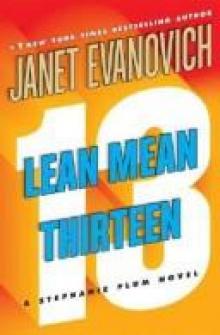 Lean Mean Thirteen
Lean Mean Thirteen One for the Money
One for the Money Full Speed
Full Speed Top Secret Twenty-One
Top Secret Twenty-One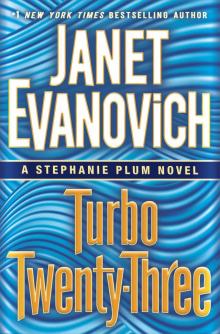 Turbo Twenty-Three
Turbo Twenty-Three Dangerous Minds
Dangerous Minds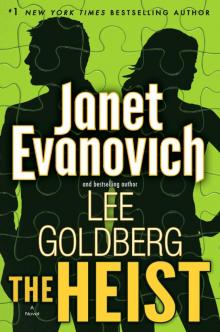 The Heist
The Heist Takedown Twenty
Takedown Twenty Two for the Dough
Two for the Dough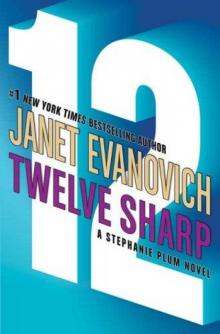 Twelve Sharp
Twelve Sharp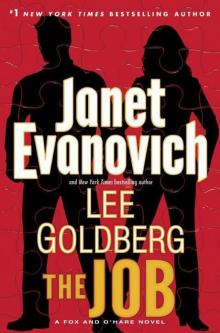 The Job
The Job Metro Girl
Metro Girl Full House
Full House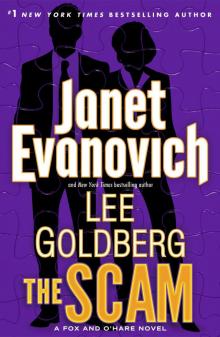 The Scam
The Scam Hot Stuff
Hot Stuff Wicked Charms
Wicked Charms Hero at Large
Hero at Large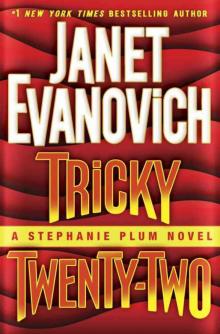 Tricky Twenty-Two
Tricky Twenty-Two Plum Lovin'
Plum Lovin' Eleven on Top
Eleven on Top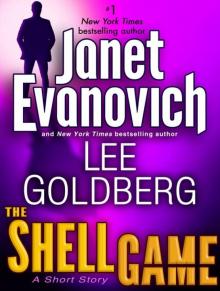 The Shell Game
The Shell Game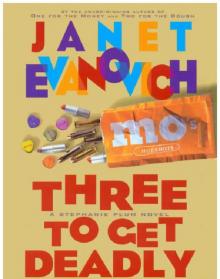 Three to Get Deadly
Three to Get Deadly Four to Score
Four to Score Seven Up
Seven Up High Five
High Five Hot Six
Hot Six The Grand Finale
The Grand Finale Hard Eight
Hard Eight Plum Spooky
Plum Spooky Foul Play
Foul Play Ten Big Ones
Ten Big Ones Smokin' Seventeen
Smokin' Seventeen Fearless Fourteen
Fearless Fourteen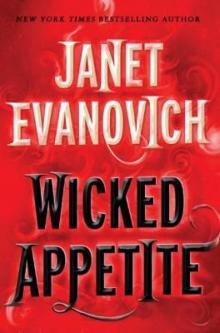 Wicked Appetite
Wicked Appetite Curious Minds
Curious Minds Sizzling Sixteen
Sizzling Sixteen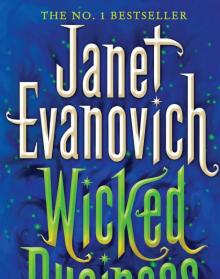 Wicked Business
Wicked Business The Big Kahuna
The Big Kahuna Explosive Eighteen
Explosive Eighteen Visions of Sugar Plums
Visions of Sugar Plums Full Blast
Full Blast Back to the Bedroom
Back to the Bedroom Finger Lickin' Fifteen
Finger Lickin' Fifteen Smitten
Smitten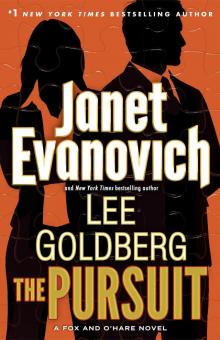 The Pursuit
The Pursuit Twisted Twenty-Six
Twisted Twenty-Six Love in a Nutshell
Love in a Nutshell The Chase
The Chase Notorious Nineteen
Notorious Nineteen Hardcore Twenty-Four
Hardcore Twenty-Four The Rocky Road to Romance
The Rocky Road to Romance Twisted Twenty-Six (Stephanie Plum 26)
Twisted Twenty-Six (Stephanie Plum 26) Manhunt
Manhunt Plum Lucky
Plum Lucky Full Bloom
Full Bloom Wife for Hire
Wife for Hire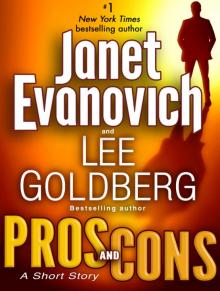 Pros and Cons
Pros and Cons Fortune and Glory
Fortune and Glory Motor Mouth: A Barnaby Novel
Motor Mouth: A Barnaby Novel Naughty Neighbor
Naughty Neighbor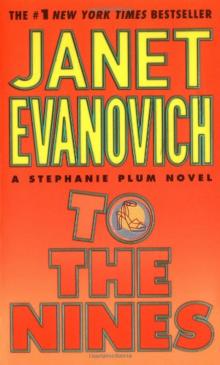 To the Nines
To the Nines The Husband List
The Husband List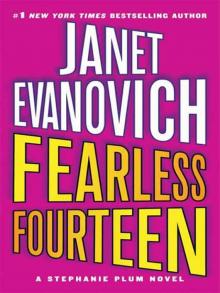 Fearless Fourteen: A Stephanie Plum Novel
Fearless Fourteen: A Stephanie Plum Novel Smitten - LOVESWEPT - 392
Smitten - LOVESWEPT - 392 Plum 12 - Twelve Sharp
Plum 12 - Twelve Sharp Smokin' Seventeen: A Stephanie Plum Novel (Stephanie Plum Novels)
Smokin' Seventeen: A Stephanie Plum Novel (Stephanie Plum Novels) Top Secret Twenty-One: A Stephanie Plum Novel
Top Secret Twenty-One: A Stephanie Plum Novel SMITTEN (Loveswept, No 392)
SMITTEN (Loveswept, No 392) Plum 10 - Ten Big Ones
Plum 10 - Ten Big Ones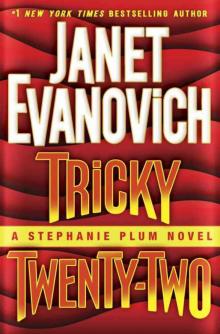 Tricky Twenty-Two: A Stephanie Plum Novel
Tricky Twenty-Two: A Stephanie Plum Novel Look Alive Twenty-Five
Look Alive Twenty-Five Wicked Charms: A Lizzy and Diesel Novel
Wicked Charms: A Lizzy and Diesel Novel Motor Mouth
Motor Mouth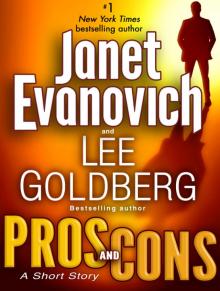 Pros and Cons: A Short Story
Pros and Cons: A Short Story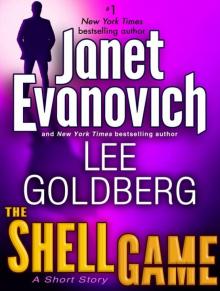 The Shell Game: A Fox and O'Hare Short Story (Kindle Single)
The Shell Game: A Fox and O'Hare Short Story (Kindle Single) Plum Boxed Set 1, Books 1-3 Stephanie Plum Novels)
Plum Boxed Set 1, Books 1-3 Stephanie Plum Novels) Between the Plums
Between the Plums